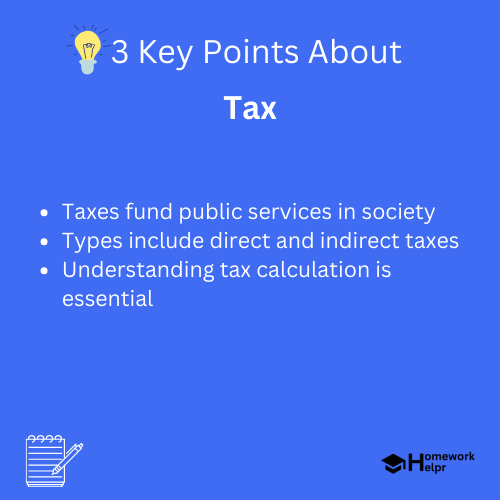📝 Summary
Understanding taxes is essential for responsible citizenship. Taxes are financial contributions that governments impose on individuals and businesses, crucial for funding public services and maintaining infrastructure. The primary types are direct taxes, paid directly to the government, and indirect taxes, paid through consumer purchases. Taxes support areas like education, healthcare, and public safety. Understanding how taxes are calculated and the consequences of not paying them is vital for efficiently contributing to society and ensuring essential services’ continued function. Compliance with tax obligations reinforces civic responsibility.
Understanding Taxes: A Beginner’s Guide
As responsible citizens, understanding taxes is essential. Taxes are the compulsory financial contributions imposed by the government on individuals and businesses. These contributions are crucial for maintaining public services and infrastructure, from hospitals to schools, and ensuring the smooth operation of society.
What Are Taxes?
In simple terms, taxes are fees that government entities collect from people or organizations to fund public services and projects. This includes everything from the roads we drive on to the teachers who educate us. The two main types of taxes are direct taxes and indirect taxes.
- Direct Taxes: Taxes paid directly to the government by the individuals or organizations, such as income tax.
- Indirect Taxes: Taxes that are applied on goods and services, paid indirectly by consumers, like sales tax.
Definition
Compulsory: Required by law or a rule; obligatory. Infrastructure: The fundamental facilities and systems serving a country, city, or area.
Why Do We Pay Taxes?
The primary reason we pay taxes is to fund public services that benefit everyone. Without taxes, essential services would not exist, and society would struggle to function efficiently. Here‚’ a brief overview of what our tax money typically supports:
- Education: Schools, universities, and educational programs.
- Healthcare: Hospitals and medical services that are vital for public well-being.
- Public Safety: Police, firefighters, and emergency services to keep us safe.
- Infrastructure: Roads, bridges, and public transportation systems.
Examples
When you buy a pack of chewing gum for $1, a portion of that money goes to the government as sales tax. This sales tax is then used to improve local roads and schools in your community.
The Different Types of Taxes
Taxes come in various forms, each serving different purposes. Here are the most common types:
- Income Tax: A tax based on an individual’s income or profits.
- Sales Tax: A tax imposed on sales of goods and services.
- Property Tax: Taxes based on property value, including real estate.
- Corporate Tax: Tax on the income of corporations.
Each type of tax plays a specific role in society, addressing different aspects of public funding and services.
The Tax Calculation Process
Understanding how taxes are calculated is essential for anyone filing a tax return. Generally, the process includes determining your total income, allowing deductions, and applying the correct tax rate. Here‚’ an overview of the tax calculation:
- Determine Total Income: Combine all sources of income, including salary, investments, and any side jobs.
- Subtract Deductions: Deductions can reduce your taxable income. Common deductions include mortgage interest and educational expenses.
- Apply Tax Rates: Different amounts of income are taxed at different rates, commonly referred to as tax brackets.
Definition
Deductions: Amounts that reduce income subject to tax, often for expenses like education or home mortgage. Tax Bracket: A range of incomes taxed at a particular rate.
The Importance of Paying Taxes
While the idea of paying taxes can be daunting, their importance cannot be overstated. Here are several key reasons why paying taxes is vital:
- Funding Public Services: Taxes help support essential services that everyone uses.
- Building Infrastructure: Taxes allow governments to invest in and maintain roads, bridges, and public transport.
- Creating a Fair Society: Progressive tax systems can help reduce income inequality and provide support for the less fortunate.
❓Did You Know?
Did you know that the word ‘tax’ comes from the Latin word “taxare,” which means “to estimate?”
Consequences of Not Paying Taxes
Failing to pay taxes can lead to severe repercussions, which may include:
- Penalties: Additional fees and charges that amount to a significant financial burden.
- Legal Consequences: In extreme cases, individuals may face criminal charges.
- Loss of Benefits: Non-payers might lose out on public services and subsidies.
Examples
If someone does not pay their income tax, they may receive a notice from the government, demanding payment along with a penalty fee. Ignoring this notice could lead to future legal issues.
Tips for Understanding Taxes
Understanding taxes can seem overwhelming, but here are some tips to help make the process easier:
- Stay Informed: Read up on tax rules and regulations in your country.
- Use Resources: Online calculators and guides can help break down calculations.
- Seek Help: Consult professionals like tax advisors for complex situations.

Conclusion
In conclusion, taxes play a crucial role in the functioning of society. By understanding how they work, why they are collected, and the various types, students and young individuals can appreciate the value they bring to our community. It is also essential to comply with tax obligations to support public services and maintain civic responsibility. With this knowledge, you can navigate the world of taxes with confidence, knowing their contribution to a better society.
Related Questions on Tax
What are the main types of taxes?
Answer: Direct and indirect taxes are the main types.
Why do we pay taxes?
Answer: To fund public services that benefit everyone.
What happens if you don’t pay taxes?
Answer: You may face penalties and legal consequences.
How can I learn more about taxes?
Answer: Use resources like online calculators and tax advisors.
